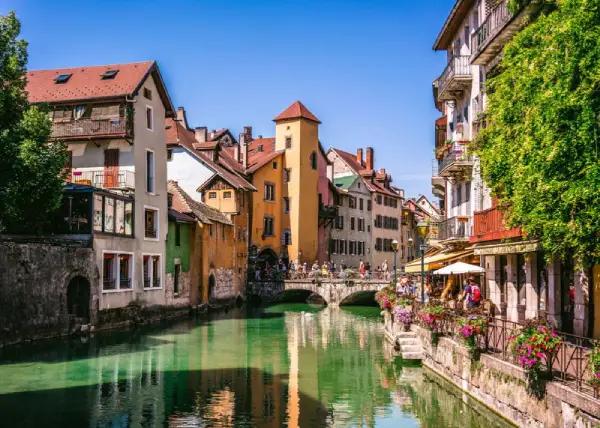TL;DR:
- Housing Costs: Renting in Paris ~€1,200/mo, rural areas ~€500/mo. Property taxes (0.2%-1.7% annually), and maintenance costs.
- Healthcare Costs: Public system (Sécurité Sociale) covers most costs. Doctor visit ~€25, out-of-pocket a few euros. Private healthcare more expensive. Essential to have health insurance (Carte Vitale).
- Monthly Living Expenses: Groceries $300-$400, utilities $100-$200, internet ~$30, public transport ~$75, dining/entertainment ~$100. Total ~$1,500-$2,500.
- Affordable Retirement Locations: Brittany, Occitanie, Nouvelle-Aquitaine; cities Limoges, Metz, Perpignan.
- Living on a Pension: Budget wisely, shop local markets, use public transport, seek senior discounts.
- Food and Grocery Costs: €250-€350/mo on groceries. Cheaper in local markets, seasonal foods more affordable.
- Transportation Costs: Public transport monthly pass ~€70, car ~€200/mo fuel, insurance €30-70/mo. Senior discounts available.
- Entertainment Costs: Movies €20-€30, fitness clubs €30-€60, dining out €15-€25 per person. Local community events are often free.
Are you dreaming of spending your golden years in the picturesque landscapes of France? Curious about what it will cost to retire there? In this blog post, I’ll break down the cost of living in France for retirees. From housing and healthcare to daily expenses and entertainment, I’ll help you navigate the financial landscape so you can plan your best life abroad. Ready to dive in? Let’s get started!
What Are the Housing Costs in France for Retirees?
Housing costs in France vary greatly based on location and housing type. Whether you choose renting or buying, you need to plan carefully.
Renting vs. Buying
Renting offers less commitment, while buying is rooted in long-term plans. In popular cities like Paris or Nice, renting can save money compared to buying high-priced properties.
Average Rental Prices
Rental prices in France differ between urban and rural areas. In Paris, a one-bedroom apartment can cost €1,200 per month. In rural areas, similar accommodations might only cost €500 per month. Smaller towns provide affordable options but may lack urban amenities.
Property Taxes and Maintenance Costs
Property costs are not limited to purchase price. Property taxes in France are called “taxes foncières” and vary by region. Expect to pay from 0.2% to 1.7% of your property’s value annually. Maintenance adds costs too, especially in older properties. Repairs, renovations, and community fees (for shared buildings) can stack up.
Popular Regions for Retirees
Where do most American retirees live in France? Provence, Dordogne, and Brittany are popular. These regions offer moderate living costs and rich culture. France has many options, but each region’s housing cost will affect your budget. Paris, for example, is very high compared to rural Provence.
Impact of Location on Housing Costs
Location drastically impacts housing costs. Urban areas like Paris or Lyon are expensive, while rural places are more budget-friendly. Rental prices and taxes go down outside the big cities. If you love city life, prepare for higher expenses.
For more details on housing in France, the French government offers resources about property and housing. Planning your retirement in France should include thorough research into housing costs, lifestyle preferences, and location choices.
How Much Does Healthcare Cost for Retirees in France?
First, let’s talk about France’s healthcare system. France has a mix of public and private healthcare. The public system, known as Sécurité Sociale, covers most healthcare costs. You pay into this system with taxes and small co-payments.
Now, what about the costs? For most retirees, public healthcare is very affordable. Doctor visits can cost about 25 euros. After the Sécurité Sociale pays its share, you might spend just a few euros out of pocket.
If you choose private healthcare, it costs more. You won’t pay taxes for private care, but you will pay higher fees. Some people choose private care for faster services and shorter wait times.
Retirees in France should get health insurance. The Carte Vitale is key for public healthcare. It is a green chip card that you use at health clinics. With this card, most health expenses are covered. For extras, you can get mutuelle insurance. This is a private insurance that covers gaps left by Sécurité Sociale.
Prescription medications are often low-cost. Many medicines are covered by Sécurité Sociale. You might pay just a small part of the cost. The amount you pay depends on the type of medication. Generic drugs are cheaper.
Healthcare costs can vary by region. In big cities like Paris, services can cost more. But rural areas tend to be cheaper. Here, you may get the same care for less money. You should balance your need for services with your budget.
So, can a U.S. citizen retire in France? Yes, you can! But you must plan for healthcare. Health insurance is essential to enjoying a stress-free retirement. If you need more details, it’s best to check official guidelines from the French health service. This will help you understand and manage your healthcare costs wisely.
What Are the Typical Monthly Living Expenses for Retirees in France?
The cost of living in France per month can vary, but here’s a typical breakdown for retirees.
Groceries and Daily Necessities: For groceries, expect to spend around $300 to $400 a month. This covers basic needs like bread, milk, and fresh produce. Prices might be higher in urban areas than in rural places, so it’s good to compare costs locally.
Utility Bills and Internet Costs: Monthly utilities, such as water, gas, and electricity, can cost between $100 and $200. High-speed internet starts around $30 a month. Combining services into one plan might save you a bit more.
Public Transportation and Fuel Expenses: France has great public transportation. A monthly pass in cities like Paris costs about $75. If you prefer driving, fuel might set you back around $150 monthly, depending on your usage.
Dining Out and Entertainment: Eating out in France can be a joy and a spend. A nice dinner for two at a mid-range restaurant costs roughly $60 to $80. For entertainment like movies, concerts, or gallery visits, budget about $100 a month. Look for local discounts, especially in smaller towns.
The total monthly expenses for living in France as a retiree can vary widely. On average, you might spend anywhere from $1,500 to $2,500 a month, depending on your lifestyle and location. Each cost might differ from one region to another, so considering these factors is essential when planning your living expenses in France.
By understanding these typical expenses, you can better prepare for your retirement in the charming country of France.
Where Are the Most Affordable Places to Retire in France?
Curious about the cheapest place to retire in France? The answer depends on what you value most. Here are some great choices for budget-friendly cities and low-cost regions.
Low-Cost Regions and Cities
France offers many affordable living locations. Some top regions include Brittany, Occitanie, and Nouvelle-Aquitaine. Cities like Limoges, Metz, and Perpignan also offer a low-cost lifestyle. These places often cost less for housing and daily needs.
Small Towns vs. Cities
Living in smaller towns can save you more money. They have lower costs for housing, food, and services. But, smaller towns may lack some big-city comforts like many shops and events. Cities like Toulouse or Bordeaux offer more activities, but at higher prices.
Specific Budget-Friendly Locations
- Limoges: A gem in central France with low rent and great culture.
- Perpignan: Near Spain, offers sunny weather and affordable homes.
- Metz: Quaint city with beautiful architecture and fair costs.
These cities have many retirees due to their balance of culture, services, and cost.
Factors Influencing Affordability
Many factors affect how cheap a place is. Housing is the biggest cost. Small towns often have more affordable homes. Other factors include grocery prices, public transportation, and healthcare access.
Quality of Life Considerations
Cheaper doesn’t mean worse. Many budget-friendly places are rich in nature, history, and culture. Smaller towns offer peace and a close-knit community. In contrast, cities provide more activities and services but at a higher cost.
Remember, affordability is about more than just costs. Think about your lifestyle and what makes you happy. Choosing the right place to retire involves considering your needs, interests, and budget. If retirement in France excites you, explore these regions and cities to find your perfect spot.
How Can Retirees Manage Living on a Pension in France?
Overview of the Pension System in France for Expats
Retiring in France with a pension can be a great experience. The pension system in France is comprehensive and stable. Expats from the U.S. or other countries can transfer their pensions to French banks. This makes accessing your money easier and reduces conversion fees.
Strategies for Budgeting on a Fixed Income
Living on a fixed income means wise budgeting. Start by detailing your monthly income and expenses. Prioritize needs over wants. Essential costs are rent, utilities, and groceries. Track all spending to find where you can save.
Cost-Cutting Tips for Retirees
Look for ways to cut everyday costs. Shop at local markets for fresh, affordable produce. Use public transport instead of owning a car. It’s cheaper and more convenient in cities. Dining out less frequently saves more than you think.
Government Assistance and Senior Discounts
France offers many perks for seniors. Government programs help with healthcare and housing. Check if you qualify for these benefits. Senior discounts are common on transport, entertainment, and even some grocery stores.
Financial Planning and Managing Savings
Good financial planning is key. Keep a savings fund for unexpected expenses. Consult a financial advisor to maximize your investments and pension. They can guide you on how to get the most from your pension while living cost-effectively.
What Are the Food and Grocery Costs for Retirees in France?
Food and grocery costs in France can vary. You can expect to spend around €250 to €350 each month on groceries. That holds whether you live in Paris or a smaller city. The price of fresh fruits, bread, cheese, and meats may differ based on where you shop.
Supermarkets vs. Local Markets
Shopping at supermarkets like Carrefour or Auchan might be convenient. Stores often have good deals on bulk items. But if you wish to support local farmers and get fresher products, head to the local markets. For instance, a local French market might sell fresh bread for €1, while the same item at a supermarket could cost €1.50.
Seasonal Foods Impact Prices
Eating fruits and vegetables in season can save you money. Strawberries in summer will be cheaper than ones flown in during winter. Winter offers root vegetables like carrots and potatoes at lower prices, while summer has tomatoes and peaches.
Dining Out Costs
Dining out in France does not have to be pricey. A meal at a local bistro might cost you around €15 to €25. A meal at a high-end restaurant could reach up to €50 or more. Lunch specials or prix-fixe menus often offer the best value.
Tips to Save Money on Groceries
Planning meals can help cut costs. Make a list before shopping to avoid buying unnecessary items. Buying generic brands can also be cheaper without compromising on taste or quality.
Shopping at stores like Lidl or Aldi can help manage your grocery expenses too. Both offer lower-priced alternatives to big-brand items. Visit this resource to learn more about food and drink in France.
In summary, planning and being smart about where and when you shop can help you manage your food and grocery expenses while living in France.
How Does Transportation Affect the Cost of Living for Retirees in France?
Public transportation options are a great way to move around France. Trains, buses, and trams are often reliable and affordable. You can expect rates for local travel to be budget-friendly. For instance, a monthly bus pass in major cities costs about €70. Trains can be a bit pricier, but they offer senior discounts which ease the cost.
Owning a car is one of the biggest expenses after housing. In France, the average car costs around €200 per month in fuel. Add to that another €30-70 per month for insurance. You’ll also need to pay for regular maintenance and parking fees, which can add up. For some people, using a car is necessary. In rural areas, public transport is less frequent.
For retirees, the good news is there are many discounts available. Seniors can apply for reduced fare passes for trains and buses. The Carte Senior+ offers discounts up to 50% on train tickets. Always check for local deals in your town or city.
Urban transportation costs tend to be higher compared to rural areas. Cities offer more public transport options, which are convenient but can be pricey. Rural areas might force you to rely on a car, but insurance and fuel costs are usually lower outside of big cities. You’ll need to balance the options depending on where you live.
There are simple ways to save money on transport costs. Buy monthly or yearly passes instead of single tickets. Share rides with neighbors when possible. Use bicycles for short trips; many cities have bike-sharing options. Planning ahead and using senior discounts will go a long way in reducing expenses.
Transportation costs are a key part of living in France as a retiree. Make sure you factor these in when planning your budget for retirement. For more detailed advice on living in France, including transportation, Lonely Planet offers comprehensive guides.
What Are the Entertainment and Leisure Costs for Retirees in France?
When retiring in France, you will find many ways to enjoy life. Entertainment costs can vary, but here are some key points.
Average Costs of Common Leisure Activities
You might spend around €20 to €30 for a movie ticket, depending on the city. A fitness club membership typically costs from €30 to €60 a month. If you enjoy swimming, expect to pay about €3 to €5 for a pool entry in most towns.
Membership Fees for Clubs and Associations
Joining clubs and associations is a popular way to stay active. For example, the local golf club might charge around €1,000 per year. Local knitting or art clubs can be much cheaper, often under €50 per year.
Costs for Cultural Events
France is famous for its rich culture. Theatre tickets range from €25 to €80, depending on the show and city. Concerts can cost between €50 and €150. Museums often have lower entry fees, around €10 to €20 per visit, and some offer senior discounts.
Dining Out and Socializing Expenses
Dining out is a joy in France. A meal at a modest restaurant costs about €15 to €25 per person. A fancy dinner might set you back €40 to €100. If you’re into socializing at cafes, a coffee or a glass of wine costs around €3 to €5.
Affordable Entertainment Options for Retirees
For budget-friendly fun, look into local community events, which are often free or very cheap. Walking or cycling in the beautiful parks costs nothing. Many towns also offer free outdoor concerts and festivals, especially in the summer.
Overall, your entertainment and leisure budget will depend on your lifestyle. By making smart choices, you can enjoy all the wonderful experiences France has to offer without breaking the bank.
Conclusion
To live comfortably as a retiree in France, it’s crucial to understand housing costs, healthcare, and overall living expenses. We dove into rental and property taxes, healthcare costs, and more affordable living spots. Planning around a pension and understanding food and transportation costs can help you manage your finances well. Adapting to your new life in France involves a mix of good planning and enjoying your adventures. Remember, each region offers unique experiences and costs, so choose what best fits your lifestyle. Happy travels and enjoy your new chapter in France!












